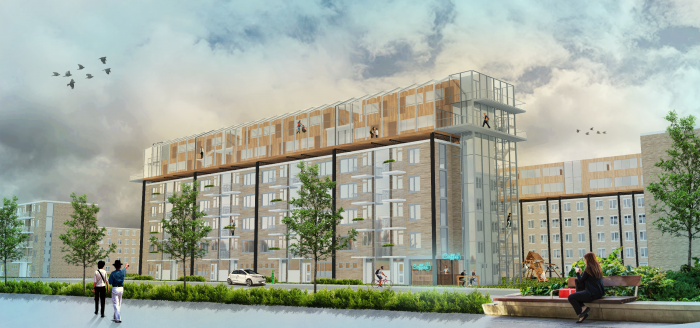
Symbiotic Urban Movement (SUM) aims to achieve a mutual and beneficial relationship between the user, the community and the environment: a symbiosis. The team will use the platform of the Solar Decathlon Europe competition which will take place in Wuppertal, Germany in 2021 to accelerate this vision. The Solar Decathlon (SD) platform is a student competition for sustainable architecture and engineering initiated in 2002 by the United States Department of Energy. The 2021 competition focuses on the revitalisation of urban building stocks, therefore university teams heading to Wuppertal will centre their efforts on a value-added renovation, transformation or the reuse of existing apartment buildings to tackle issues regarding city densification.
SUM, from TU Delft in the Netherlands, aims to craft resource-responsible and resilient neighbourhoods. There are 847,000 tenement flats in the Netherlands built between 1953-1967, which represent 11% of the total housing stock. By addressing this type, SUM has the opportunity to create a system that can be used across the Netherlands and even Europe. Tackling this type of buildings creates the opportunity to contribute to the environmental task of being energy-neutral in 2050 and to contribute to the Dutch goal of adding one million homes by 2030. In addition to the focus on modularity, circularity, and sustainability, SUM also looks for solutions that contribute to the urban and social living environment. According to SUM, creating a community based on new and sustainable habits is an opportunity to create a major impact on our social and environmental footprint. SUM aims to create strong bonds between neighbours by using sustainable habits to create an effective and resilient community.
Currently, SUM consists of 42 enthusiastic students, and with 15 nationalities the team aims to grow as an international and interdisciplinary team. SUM aims to host workshops, events and presentations during the project to encourage eco-friendly habits and increase awareness on the climate crisis within the university of TU Delft, the site of The Hague, and Wuppertal. The chosen case study of several tenement flats in Bouwlust in The Hague are seriously underperforming on environmental, social and economic aspects. Therefore this project aims to tackle these issues, creating net-positive redevelopment, using this to create symbiotic solutions and sustainable habits and providing affordable accommodation.
SUM’s vision of the renovation is to aim for the highest impact with minor interventions. By not displacing the inhabitants during the renovation and respecting the modernist heritage of the buildings SUM wants to make the project feasible for social housing. SUM aims to improve energy performance and create not only more apartments but also communal areas to increase social cohesion. Modular, prefabricated structures will be used to reduce construction time and biobased materials will be implemented in keeping with SUMs eco-friendly goals.
To SUM it up, the integrated design will create a platform that strengthens the local community and encourages the general public to adopt new and sustainable habits. SUM aims to craft a symbiotic framework which eases accessibility to affordable living, creates stronger communities and a sustainable built environment. By combining each of these elements SUM will form an effective and resonating solution for the future.
